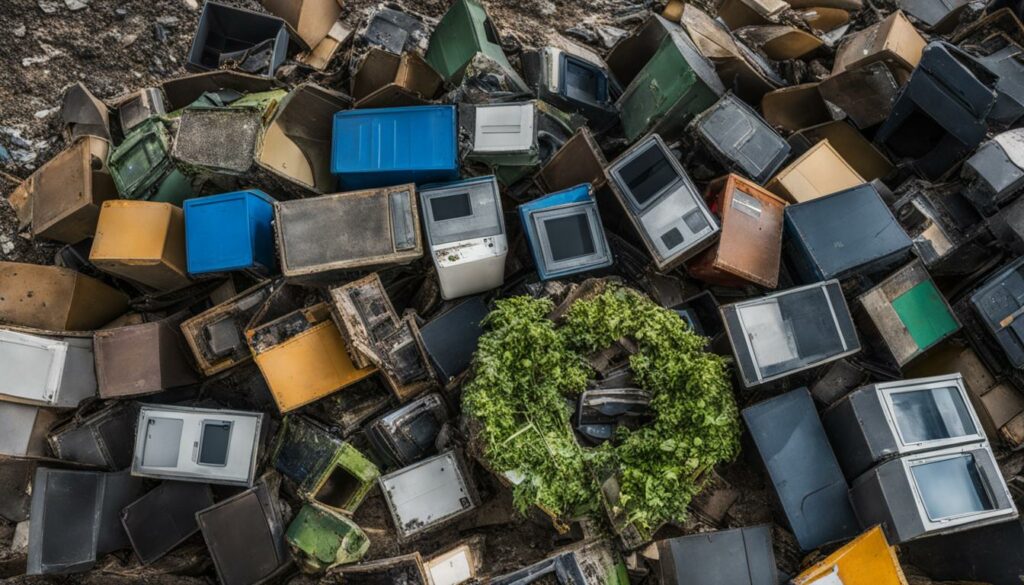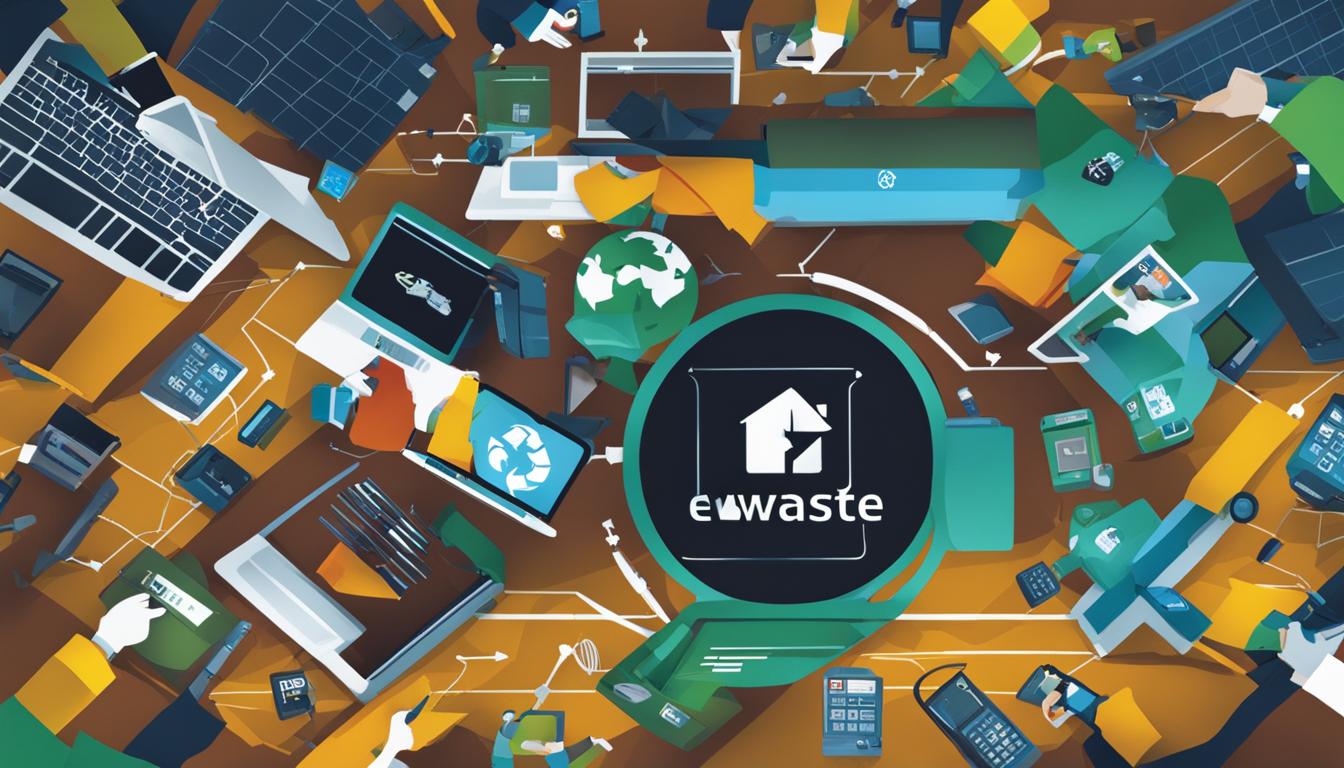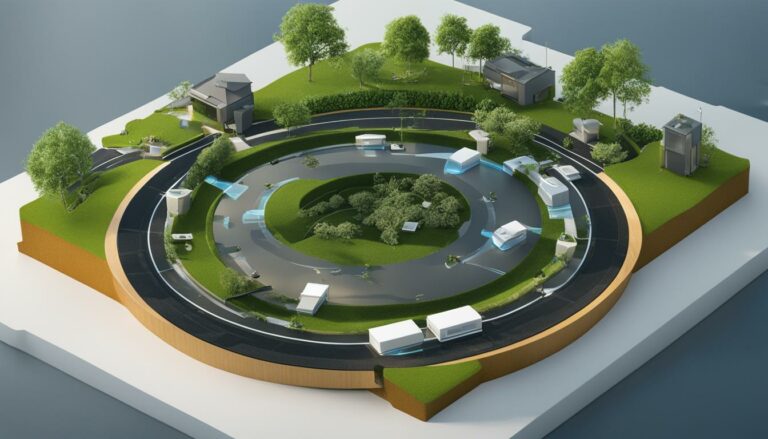Public-Private Partnerships in E-waste Management
Electronic waste management is a pressing issue that requires sustainable solutions and strong collaboration between public and private sectors. Public-private partnerships play a vital role in advancing e-waste management by combining resources, expertise, and responsibility. These partnerships not only promote environmental conservation efforts but also raise awareness among consumers about responsible e-waste disposal.
Key Takeaways:
- E-waste public-private partnerships drive sustainable recycling solutions.
- Collaboration between government and private stakeholders is essential for effective electronic waste management.
- Public-private partnerships contribute to corporate social responsibility by minimizing environmental contamination.
- Proper e-waste management is crucial for the health and safety of waste collectors and nearby communities.
- These partnerships foster a collaborative approach to address the global challenge of electronic waste.
The Role of Public-Private Partnerships in E-waste Management
Public-private partnerships in e-waste management play a crucial role in addressing the challenges posed by electronic waste and promoting sustainable practices. These partnerships enable collaboration between the government and private sectors, driving the development and implementation of effective recycling programs and waste reduction strategies.
E-waste Regulations
One of the key aspects of public-private partnerships in e-waste management is the formulation and enforcement of e-waste regulations. These regulations establish guidelines for the proper disposal and recycling of electronic equipment, ensuring that it does not end up in landfills or contribute to environmental pollution. By working together, governments and private stakeholders can create robust regulatory frameworks that promote responsible e-waste management.
Circular Economy Initiatives
Public-private partnerships also play a vital role in promoting circular economy initiatives in the e-waste sector. The circular economy focuses on reducing waste, reusing materials, and recycling products to minimize environmental impact. Through collaborative efforts, these partnerships drive the adoption of circular economy principles in the management of electronic waste, encouraging the responsible use of resources and the reduction of waste generation.
E-waste Reduction Strategies
Another area where public-private partnerships excel is in the development of e-waste reduction strategies. These strategies aim to minimize the generation of electronic waste by promoting sustainable product design, encouraging the reuse of electronic equipment, and implementing take-back programs. By working together, government and private stakeholders can implement innovative solutions that extend the lifespan of electronic devices and reduce the overall environmental footprint of the e-waste sector.
Waste Disposal Collaboration
Collaboration between the public and private sectors is essential for efficient waste disposal in the e-waste management industry. Public-private partnerships facilitate the establishment of proper waste collection systems and disposal infrastructure, ensuring that electronic waste is handled in an environmentally responsible manner. By sharing resources and expertise, these partnerships can improve the efficiency and effectiveness of waste disposal processes, minimizing the impact on the environment and public health.
Electronic Waste Recycling Programs
One of the most significant contributions of public-private partnerships in e-waste management is the establishment and operation of electronic waste recycling programs. These programs provide accessible and convenient avenues for individuals and businesses to recycle their electronic devices responsibly. By partnering with private recyclers and leveraging government support, these programs can effectively collect and process electronic waste, diverting it from landfills and promoting resource recovery.
| Benefits of Public-Private Partnerships in E-waste Management | Key Partnerships and Initiatives |
|---|---|
| Promote sustainable recycling solutions | E-waste regulations |
| Minimize contamination of soil, groundwater, and air | Circular economy initiatives |
| Address health and safety concerns | E-waste reduction strategies |
| Drive responsible disposal practices | Waste disposal collaboration |
| Contribute to a cleaner and more sustainable environment | Electronic waste recycling programs |
Benefits of E-waste Public-Private Partnerships
E-waste public-private partnerships offer a range of benefits that contribute to sustainable recycling solutions and environmental conservation efforts. These partnerships play a vital role in addressing the challenges posed by electronic waste and ensuring its proper management. One significant advantage is the positive impact on waste collectors and communities living near e-waste disposal sites.
By properly managing e-waste through public-private partnerships, the risk of contamination of soil, groundwater, and air can be minimized. Electronic waste contains toxic components such as lead and mercury, which, if not handled correctly, can have severe environmental and health consequences. Through collaborative efforts, these partnerships aim to mitigate these risks and protect the environment.
In addition to environmental benefits, e-waste public-private partnerships also foster responsibility and accountability. By creating a collaborative approach, these partnerships promote transparency and encourage responsible recycling practices among both public and private entities. This collective effort results in improved environmental outcomes and a cleaner, more sustainable future.
| Benefits of E-waste Public-Private Partnerships |
|---|
| 1. Minimizes contamination of soil, groundwater, and air |
| 2. Protects the environment from toxic components present in electronic waste |
| 3. Enhances responsibility and accountability in recycling practices |
| 4. Promotes transparency and collaborative efforts |
| 5. Contributes to improved environmental outcomes |

“E-waste public-private partnerships are a key driver in achieving sustainable recycling solutions and protecting the environment from the hazardous effects of electronic waste.” – Environmental Expert
Success Stories of E-waste Public-Private Partnerships
E-waste public-private partnerships have proven to be highly successful in promoting responsible disposal and implementing effective recycling practices for electronic equipment. Two notable examples of such partnerships are Recycle My Electronics in Canada and the Waste Electrical and Electronic Equipment (WEEE) Directive in Europe.
Recycle My Electronics is a collaboration between the Electronic Products Recycling Association and various levels of government in Canada. This partnership has established convenient drop-off locations for residents to recycle their old electronics, ensuring responsible disposal. Since its inception, Recycle My Electronics has collected over 390,000 metric tonnes of e-waste, preventing it from ending up in landfills and contributing to environmental pollution. This success is a testament to the effectiveness of public-private partnerships in driving sustainable recycling practices.
Recycle My Electronics: “Together, we can make a difference. By recycling responsibly, we can protect our environment and create a sustainable future for generations to come.”
In Europe, the WEEE Directive has played a significant role in promoting electronic equipment recycling across member states. This directive sets targets for the collection, recycling, and recovery of e-waste, encouraging responsible management practices. As a result, recycling rates have significantly increased, and a considerable amount of e-waste has been diverted from landfills. The WEEE Directive showcases the power of public-private partnerships in driving policy change and fostering the adoption of sustainable practices.
| Country | Recycling Rate (%) | E-waste Sent to Landfills (tonnes) |
|---|---|---|
| Germany | 85 | 8,000 |
| France | 70 | 12,000 |
| United Kingdom | 75 | 10,500 |
| Italy | 65 | 15,200 |
These success stories demonstrate the positive impact of e-waste public-private partnerships on responsible disposal and recycling practices. By leveraging the combined efforts of government and private entities, these partnerships have effectively managed electronic waste, preventing environmental harm and promoting a more sustainable future.
Conclusion
E-waste public-private partnerships play a vital role in advancing sustainable electronic waste management. By driving the development and implementation of effective recycling programs, these partnerships contribute to a cleaner and more sustainable environment. They also raise public awareness about responsible recycling practices, promoting a circular economy.
With the continued growth of electronic equipment, proper electronic waste management becomes essential. E-waste public-private partnerships address this challenge by embracing sustainable practices and fostering a more responsible approach to recycling. By implementing recycling programs and promoting responsible disposal practices, these partnerships contribute to a greener future.
It is crucial to recognize the importance of public-private collaboration in tackling the electronic waste problem. By combining the resources and expertise of both sectors, these partnerships pave the way for effective electronic waste management. Through sustainable practices and responsible recycling, they create a more sustainable future for generations to come.
FAQ
What is the role of public-private partnerships in e-waste management?
Public-private partnerships play a crucial role in advancing sustainable e-waste management. These partnerships enable collaboration in policy formulation, community awareness, waste management systems, evidence creation, and formal recycling.
What are the benefits of e-waste public-private partnerships?
E-waste public-private partnerships promote sustainable recycling solutions, contribute to environmental conservation efforts, address health and safety concerns, minimize contamination of soil, groundwater, and air, and foster responsibility and accountability for improved environmental outcomes.
Can you provide examples of successful e-waste public-private partnerships?
Two successful examples are Recycle My Electronics in Canada, which has collected over 390,000 metric tonnes of e-waste through convenient drop-off locations, and the Waste Electrical and Electronic Equipment (WEEE) Directive in Europe, which has significantly increased recycling rates and reduced e-waste sent to landfills.
What is the importance of public awareness about responsible e-waste disposal?
Public awareness programs are crucial to educate consumers about responsible e-waste disposal. E-waste contains toxic components that can contaminate the environment, making proper management essential for environmental sustainability.
How do e-waste public-private partnerships contribute to a cleaner and more sustainable environment?
By embracing the circular economy and promoting responsible recycling, e-waste public-private partnerships contribute to a cleaner and more sustainable environment. They drive the development and implementation of effective recycling programs while raising public awareness about responsible disposal practices.
Source Links
- https://energy5.com/the-role-of-public-private-partnerships-in-promoting-electrical-equipment-recycling
- https://www.tbsnews.net/economy/corporates/experts-urge-public-private-partnerships-e-waste-management-741962
- https://www.itu.int/en/ITU-D/Regional-Presence/AsiaPacific/SiteAssets/Pages/Events/2019/Policy-awareness-workshop-on-E-waste/recycling PPP draft nov.21.pdf















